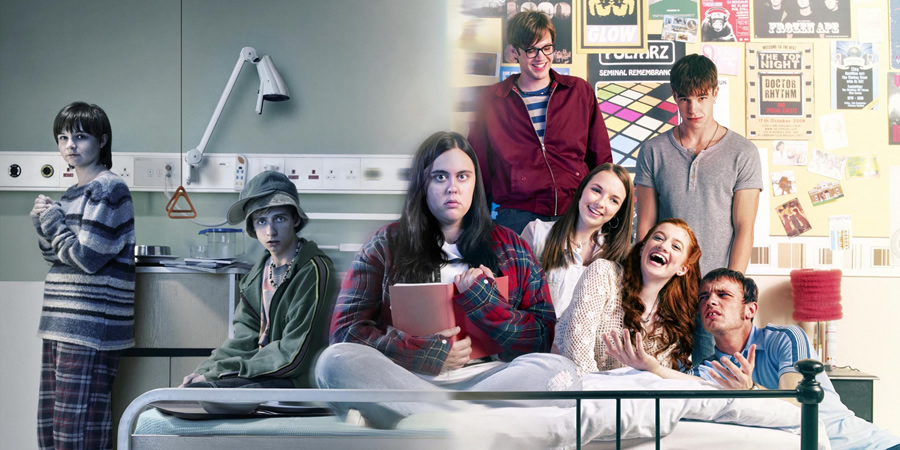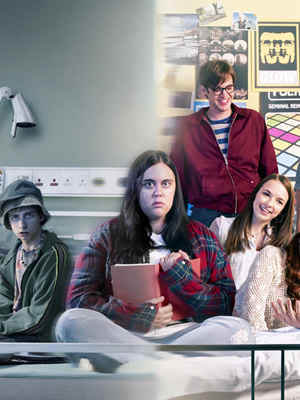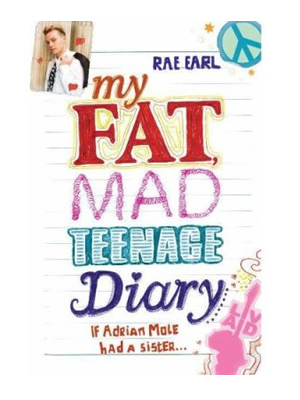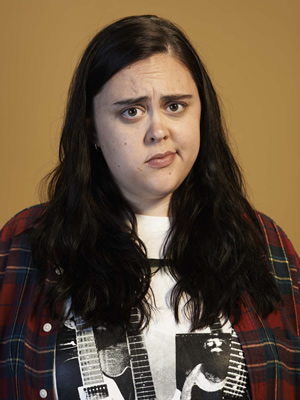Rae Earl interview


Back in the tail-end of the 80s, when the rave culture was getting going and the Manchester scene was just starting out, the UK was an exciting place to be. Unless, that is, you were 17, lived in Stamford, in Lincolnshire, suffered from mental health issues, hated yourself, and ate too many Wagon Wheels. That was Rae Earl's life. She kept a diary of every terrible, glorious, heartbreaking moment of it which, decades later, she would publish. Now, her book, My Fat, Mad Teenage Diary, has been turned into a series for E4 (pictured). Here the real Rae reveals a little more about the genesis of her diary, from tear-spattered page to publication, and explains where her story has gone since then...
When did you first start keeping a diary, and what was the motivation behind doing so?
I'd originally started keeping a diary in the early 80s after seeing Ghostbusters, because I was so excited, but then I gave it up after about a year, and burnt it a few years later because it was full of nonsense. Then I started a diary in January 1989, principally because I needed to rant to somebody, I needed something I could confide in completely confidentially - despite hiding it in the most obvious place in the world, under my bed. I was convinced my mum would never think of looking there! I just needed something to talk to every night that was just mine.
Did you write in it religiously every day, or was it just when you needed to let off steam?
I needed to let off steam pretty much religiously every day! There might be four or five entries in one day, and maybe just one in another. There was also a separate book of poetry, and several sheets of paper with just random rants on as well. I wouldn't necessarily take my diary to school, so I'd need to get a bit of paper and rant on that. So sometimes there was a little bit and sometimes there was a lot.
Did you go back and read them in the intervening years between writing them and then the time when you decided to publish them?
No. What happened was they kind of petered out at University as I discovered having a life and sex. Then, because if the inflammatory and embarrassing nature of them, I pretty much carried them around with me everywhere. I didn't really look at them, though. Then, in 2001, I was doing a breakfast show on the radio with my husband, and I was cleaning out a room at home, and I was just about to bin them, honestly just about to, and my husband said "What are they?" And I said "These are my teenage diaries," and he said "Okay, we're going to read them out on air." So we did, every day. Obviously the radio version was highly sanitised, what you can read out at 8:10am is fairly limited. You've got to limit the amount of distressing mental illness or hardcore sex. But in the book, we could just go for it. So I didn't really look at them in the intervening period at all, but when it came to publishing them, I went through them and was delighted, horrified, a mixture of many emotions.
You decided to go down the route of publishing them. What did you do in the way of editing them first?
I did take some liberties with time and people's characters, because Bethany is a combination of girls, she isn't just one. Quite a lot of bits were taken out, because obviously while I didn't mind embarrassing myself, I had to think of others. And Rae then is quite an unreliable narrator, so perhaps people who are being portrayed as bad aren't actually all that bad, because I was very sensitive back then. And I wanted it to be a joyful thing for people to read, I didn't want it to be uncomfortable for anyone. And I was still in touch with a lot of these people. Some I wasn't, but I am now. I didn't want them to feel uncomfortable.
There were some great things that didn't make it in, because I wanted to be able to look people in the eye who featured in the book. Plus while I'm at peace with the idea of what I wrote about myself, but you don't know where other people - oh my God this sounds so Oprah - but you don't know where other people are on their life journey. Shoot me for saying that, but you know what I mean? So there was a fair bit of editing. But if you imagine just sitting with somebody in a pub, and what would you remind them of and what would you not remind them of, that's pretty much what I worked by.

When you were editing, did you try and get into the head of your 17-year-old self? Did you listen to music from the era and that sort of thing?
Yeah, I had a great playlist on in the background. But I think there's part of all of us that is forever 17. If I just want to channel being 17-years-old, I just walk in my mum's front door. My husband hates it, because I become a teenager again, I just lose all rationality and become unbearable. So I think all of us can channel our adolescence, even when we're in our 40s, fairly easily, with the right surroundings and the right soundtrack. It's very easy for most of us to remember being 17. It's excruciating, it's horrid, and it's great at the same time in many ways. I bet you can remember being 17!
You mentioned your mum. The book and the TV series show the relationship between your mum and the 17-year-old you was clearly strained - as they often are at that age...
'Clearly strained' is a very good way of putting it. It was dreadful.
Were you worried about putting that in, and how it would make her feel?
No, and I'll tell you why not. That was edited, and edited quite specifically. I heard Germaine Greer taking about somebody's memoirs and complaining because she said that she always felt that in memoirs, the person writing always made themselves the hero of the piece. I think that's really true, and I think you have to read the diary knowing that that is my 17-year-old, emotionally unbalanced self talking about people. I think that I'm very hard on my mum. She was being very hard on me, but I do understand absolutely now why. Had she not been tough, I think I'd now be about 30-stone, still making prawn cocktail crisp sandwiches, and sitting in my room in Stamford writing crap poetry and drawing the dole. Not that there's anything wrong with that, but I don't think that particular sort of life would have made me happy. We have a great relationship now. She's staying with me now - she'll come and stay with me for a few months, we'll sit there watching Bargain Hunt and slagging everybody off. But there's not many daughters who get on with their mothers between the ages of 13 and 20.
Was it an emotional experience, re-reading and editing the diaries?
It was emotional, but getting them published was far more emotional. The after-effects of that were very emotional, and I have to say, largely wonderful. I was still in touch with a lot of the people - my best friend then is my best friend now. There were lots of people I was still very, very close to. But there were some people I really hadn't spoken to for a long time, who I had to get in touch with and say "Look, this is what's happened, and you need to know that this is how I felt about you then." I have to say that largely, they've been wonderful, and embraced it with good humour and generosity. It's been a hell of an emotional journey. People will get in touch and say "I had no idea you were feeling like that, if I'd known I would have done this." Or people who you thought were so beautiful and sorted and had everything that you wanted felt exactly the same way. That's been the biggest revelation. The people we think have it all together probably feel as lousy as we do.
Do you get letters from angst-ridden teens, young people who are unhappy with themselves or undergoing mental health issues?
Yes, I do, and I get people on Twitter as well, because the things that were relevant then, unfortunately, are still relevant now - body image, mental health, they're still major issues. People still struggle. And sadly, when it comes to mental health - and this is a terrible thing - I suspect things are as bad as they were in terms of services and access to services back then. I think a lot of things have changed, but some things haven't. I actually think in many ways young people have it harder now, with the internet and trolling and cyber-bullying. Young people are more vulnerable in a way that we weren't vulnerable.
What were your own experiences of mental health treatment like?
It wasn't a good experience at all. But I have to look at it in the fairest way that I can, and say that I wasn't being honest with them, I wasn't telling them how bad I was. Being put in an adult psychiatric ward was wholly inappropriate, but they probably didn't have any choice, because services for adolescents then were woeful, and probably still are. Adolescent mental health just isn't considered, and I think that's an absolute tragedy. I hope, without sounding like an arrogant tosser, that I'm living proof that you can actually have a successful and happy and rounded life, having had that happen to you as an adolescent. Especially if you get the right help which - eventually - I did (but not til I was in my late 20s, when I was still suffering) and had two years of intense therapy, which helped me out no end. But what helped me back at the time of the diary was distractions of friends, school, university, schoolwork (which I bizarrely loved) things like that.

What would you say now to the 17-year-old you?
Stop eating Wagon Wheels, they're not the solution. Give yourself a break, spend more time with your friends, keep writing stuff down, and everything you think matters doesn't really matter.
How has your story ended up? Where are you now?
I live in Hobart, in Tasmania. I've been married for 13 years, I've got a little boy, and I would say I'm a fairly well-adjusted 41-year-old woman. I'd say my story is very, very happy, and my demons are tethered, and if they ever start playing around, I make them work for me. That's partly where the diary came from.
The diary has ended up on E4. What do you think of it?
I have to say, it's the most bizarre, wonderful experience you could possibly have, watching something like that. I think the team at Tiger Aspect have done such a fantastic job, I think Tom Bidwell, who wrote it, has made something wonderful from it. I love what he's done.
I love Sharon Rooney's portrayal of 'me' (pictured). She and I haven't spoken or met, quite deliberately, because I wanted her to create her own version of Rae. She has created such a wonderful Rae, and I can absolutely see a lot of me in it. I can see a lot of differences too. She has brought something really warm and wonderful to that character. I think she's fantastic. I'm absolutely thrilled, I watched the first episode and I was just blown away. I think it's funny, I think it's touching, I think it's sad, I think people will relate to it, I think they'll laugh at it, I just think it's saying something that's not been said before, it's touching on subjects that haven't been touched on before, and I am really proud to be associated with it, I really, really am.
Was it a strange experience watching a depiction of your teenage self?
Yes, it was very odd. But you kind of have to say "Okay, it's me, but it's not me." Sharon's recreation, like I say, is me, but it's not me. It's a moment caught in time. Once I got over that, I just bloody enjoyed it, I think it's a great piece of work.
Note: The following article from 2007 has a pictures of Rae both 'then' and 'now'. The Sun

